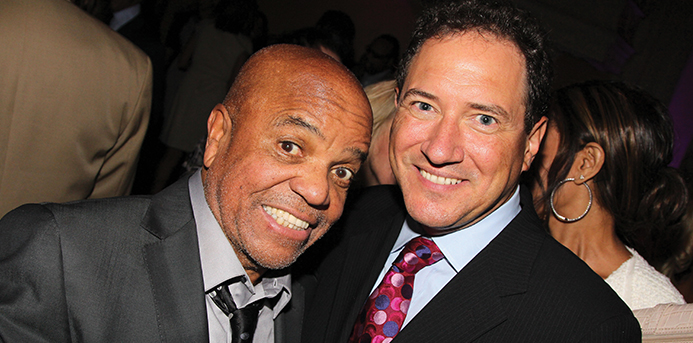Kevin McCollum has come full circle.
“Chicago was a great town for me,” McCollum says. “I drove down to see my first Broadway show—the touring company of A Chorus Line—when it came through town in 1977, and now here I am, bringing my own shows here!”
He’s being modest. If you don’t already know, Kevin McCollum is the Tony Award-winning producer of “Rent,” “Avenue Q,” “In the Heights” and other Broadway shows you’ve loved. Many have toured through Chicago over the years, and he’s reached the highest rungs on the ladder of success—but his story wasn’t always so sunny.
Born and raised in Hawaii, McCollum was 14 when his beloved mother died of breast cancer and he was shuttled off to live with relatives in Deerfield. Reeling with grief, the jump “from puka shells and flip-flops” to snow boots and parkas was a shock to the system. He found his footing here, though, graduating from Deerfield High School and then the University of Cincinnati’s Music Conservatory. A Master’s in Film Production from USC followed, then a job at Disney, before he moved to New York and founded The Booking Office in 1991, an agency he still owns a piece of today.
McCollum is headed back to town this month with his mega-hit show, “Motown the Musical.” We spoke with him recently about his role in the production of that show and many others.
Make It Better: How did you get your start in producing?
Kevin McCollum: Having worked in the film biz, I understood about distribution and how things worked. As I was building my company, I would invest in shows that friends were writing.
I met Jonathan Larson, he was writing a show, and we gave him money so he could do a little show called “Rent,” perhaps you’ve heard of it? (laughs) That’s how I transitioned into producing shows.
The history behind the making of that musical is heartbreaking and so powerful.
I’ve had a lot of loss in my life…but losing Jonathan was second only to losing my mom. When he died, my business partner Jeffrey Seller and I looked at each other and said, “It’s our job that as many people see this show as possible. It’s our job to make sure that no one forgets his name.” That’s what we tried to do. We still love seeing it being produced around the world. It’s very gratifying…the wonderful ability of musicals—I might be a little hyperbolic here—to change the world and influence culture. Art is such an important way to get in front of young people.
Now tell us about “Motown the Musical.” It’s more of a jukebox musical. What attracted you to the project?
Here’s what I think a lot of people miss. Critics like to put it in the category of jukebox musical because the songs were written for another medium. But look at the success of my musicals. Maybe it’s because I’m an only child, and my parents died when I was young, but they’re all about neighborhoods; they start with an earthly problem. You think it’s because you can’t pay the rent, or what do you do with a BA in English…but it transforms into finding your family against all odds; going to a much more redemptive, spiritual place. You realize that earthly problem wasn’t your issue. The problem was that you isolated, and you didn’t find your family. You weren’t open to finding who you really were.
[As for “Motown the Musical,”] I could see this story of how, against all odds, [Berry Gordy] transformed black music and race music into the music of middle America and…to say it’s a jukebox musical might be true of form, but in experience, when you hear this music and see how we’ve told the story, it’s such a transformative group of songs that provided the soundtrack for our culture in the second half of the 20th century, which changed race relations in our country. So I encourage you not to categorize it as a jukebox musical, but as a musical about the transformation of American culture through music. That’s what it is.
What was the creative process like with Berry Gordy?
(Laughs) He said it was very much like Motown itself. We argued; we fought; we teased each other…he’s a big believer in the fact that “competition breeds champions.”
It was a great collaboration along with the director, Charles Randolph-Wright, who really understood how to get into the story. So once Charles came on, I could eventually back off a little bit.
It’s a great ride, and that can happen because [Gordy] believed that art and talent could overcome any obstacle. That’s what Berry did. And to have a musical vocabulary, and make a musical from the songs that Berry wrote, it was a great challenge. But life is about bumping into great stories.
Working with someone you admire so much must have been personally rewarding.
Look, I’m glad we made a great show, and I’m glad we’re selling a lot of tickets. But selfishly, I just wanted to be in the room and try to create something with someone I really admired. That’s how success comes: When you put yourself in situations where you’re not sure exactly where it’s going to go economically, but you have a passion…and that has served me well. Working with Berry was not only a great honor, but I learned a great deal about myself, about him, and about the art form.
Motown the Musical runs through August 9 at the Oriental Theatre in Chicago. For tickets and more information, visit Broadway in Chicago’s website.
Photo: Berry Gordy and Kevin McCollum

